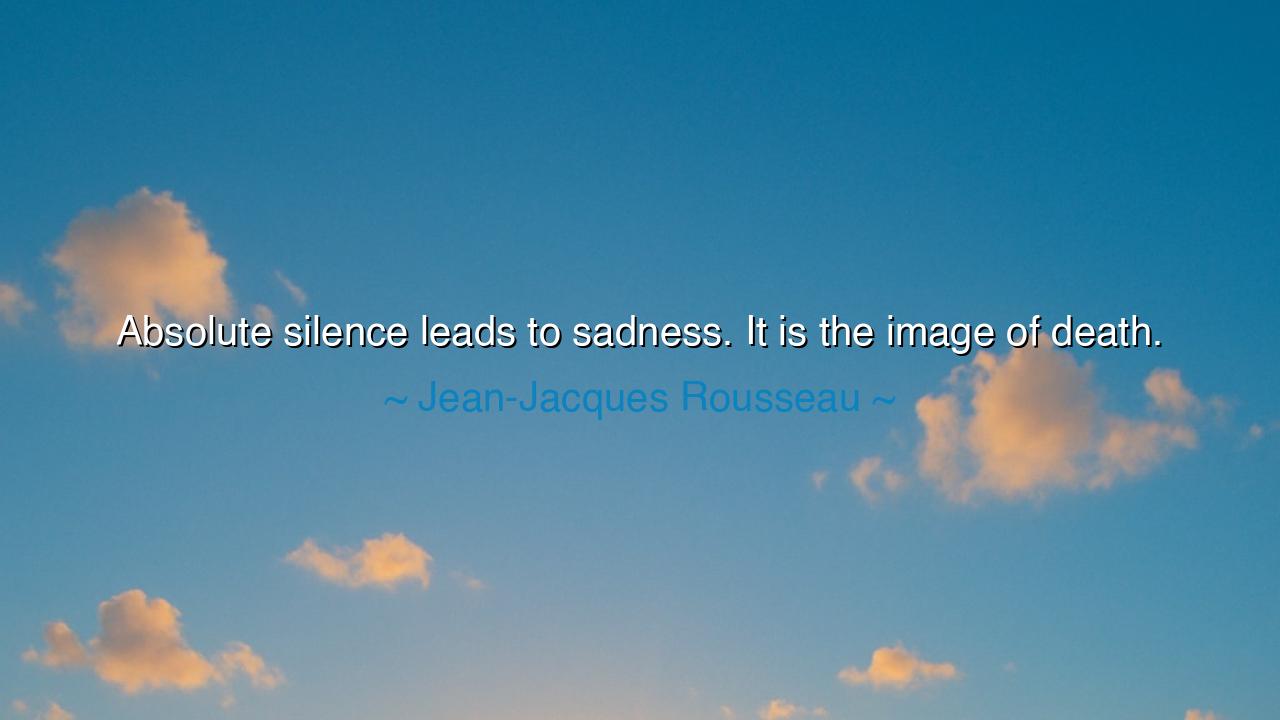
Absolute silence leads to sadness. It is the image of death.






“Absolute silence leads to sadness. It is the image of death.” Thus spoke Jean-Jacques Rousseau, the philosopher of nature and emotion, whose spirit burned against the coldness of reason alone. In this brief but profound reflection, Rousseau reveals a truth that touches the very core of human existence: that life itself is movement, sound, and communion—and where all sound ceases, the heart withers. Silence, in its totality, is not peace but absence; not serenity, but the echo of the grave. It is the void where life no longer breathes, and thus the image of death itself.
The origin of this thought comes from Rousseau’s deep meditations on human nature and solitude, expressed throughout his writings such as Reveries of the Solitary Walker. A man who often sought refuge from the cruelty of society, Rousseau was no stranger to silence. Yet even in his retreat, he discovered that when silence becomes too absolute, it ceases to soothe and begins to suffocate. He perceived that life demands rhythm, sound, and the harmony of relationship—the murmur of the wind, the whisper of thought, the beating of the heart, the voice of another soul. Without these, the spirit sinks into melancholy, for silence too long sustained mirrors the stillness of death.
To Rousseau, sound is the pulse of existence. The world itself was born in vibration—in the thunder of creation, in the song of the first bird, in the cry of a child entering the world. Every living thing carries its music, from the rustle of leaves to the laughter of humankind. When sound vanishes entirely, when all motion and voice are extinguished, the world becomes lifeless, and man feels himself slipping toward that same stillness. Thus, he warns that absolute silence is not merely external but internal—the silence of a soul cut off from love, art, and communion.
There is a story from history that reflects this truth with terrible clarity. When the English mystic William Tyndale was imprisoned for translating the Bible into the common tongue, he spent long months in a cold, stone cell. Stripped of speech, of song, and of human touch, he began to lose his sense of time and self. His letters from captivity plead not only for a coat or candle, but for companionship—for the sound of another voice. “I am very cold,” he wrote, “and the silence is unbearable.” In that silence, death began before the noose ever came. Rousseau’s words ring true here: it was not the absence of comfort, but the absence of sound, that brought despair.
Rousseau’s insight is not a condemnation of stillness, but of isolation. For there is a sacred silence—the silence of meditation, of awe before the divine, of communion with nature. But absolute silence—the kind that banishes the voice of life—becomes a tomb for the soul. When we withdraw too far, when we cease to speak, to sing, to share, we risk fading into the shadow of nonexistence. Human beings are born for connection; even our solitude seeks echo in the heart of another. To live without sound is to forget that we are not alone, and forgetting this is the first step toward sorrow.
In this, Rousseau teaches that we must cherish the living music of the world—the laughter of friends, the murmur of rivers, the hum of cities, the rustling of trees. Each sound reminds us that life continues, that movement still dances through creation. When despair approaches, it often arrives in the guise of silence. Therefore, seek not the silence that buries the spirit, but the harmony that revives it. Speak truth, sing when you can, and let your voice join the chorus of being.
The lesson, then, is this: guard against the silence that drains the soul. Let there be sound in your days—whether it be conversation, the reading of poetry, or the music of your own heart. When sadness descends, do not retreat into absolute stillness, but awaken the world around you with life’s gentle noise. Remember that sound is the breath of the living, and each word spoken in kindness, each note of laughter, is a victory over death’s stillness.
So, O listener, remember the wisdom of Rousseau: silence, though sometimes golden, must not become absolute. For when all sound dies, so too does the spirit begin to fade. Keep alive the music of your existence—speak, create, love, and let the echo of your voice remind the world that you live. For life itself is song, and to live in its melody is to triumph over the silence of the grave.






AAdministratorAdministrator
Welcome, honored guests. Please leave a comment, we will respond soon